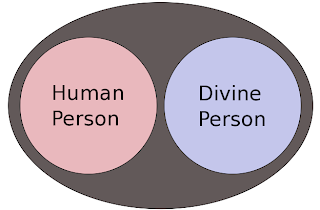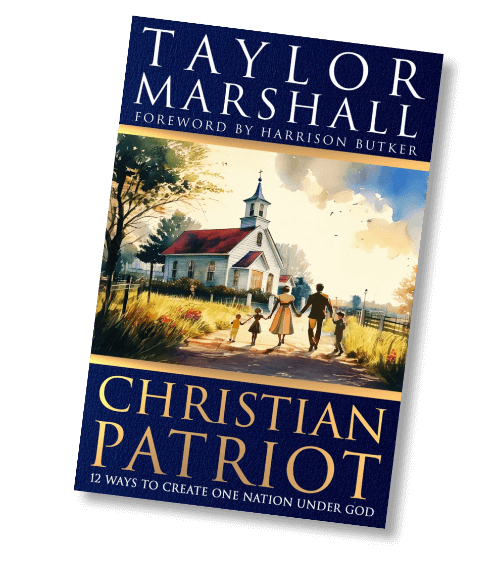Do You Have a Heresy Checklist? Here it is
Above, the Nestorian Heresy Depicted Graphically
Perhaps the best way to learn the truth about the person and natures of our Lord Jesus Christ is to learn how the ancient heresies got it wrong. Here is a basic checklist to help you along the way:
Heresies Checklist
- Docetism teaches that Jesus only appeared to be human (from the Greek dokeo meaning “to seem”). On the contrary, the Catholic Church teaches that Christ if fully God and fully man and they He possessed a physical human body.
- Sabellianism (aka modalism) falsely teaches that the Father, the Son, and the Holy Spirit are one and the same person. Sabellianists were called “Patripassians” (Greek for “the Father suffered”) because they taught that God the Father suffered on the cross since the Father is the Son and vice versa. The Catholic Faith holds that there is one Divine Essence and three divine Persons. The TV preacher TD Jakes and Oneness Pentecostals are modern-day Sabellian heretics.
- Adoptionism falsely teaches that Jesus had been a holy man who kept himself sinless. Adoptionists usually hold that Jesus achieved union with God at his baptism in the Jordan at which moment he was adopted by God the Father and given the title “Son of God.” Adoptionism of a sort is held my modern-day liberals who believe that Jesus was only a “good teacher” and “holy man” who achieved spiritual union with God on earth. Modern Unitarians also teach adoptionism.
- Arianism teaches that Jesus is not fully God – that Christ was merely the greatest creature of God the Father – that Jesus is the best creature who exists just one level above the angels. Arians teach that there was a time when the Son did not exist. On the contrary, the Catholic Church teaches that Christ co-eternal and consubstantial with the Father. God the Son is fully God and fully man. Modern-day Jehovah’s Witnesses are officially Arian – the JWs believe that Christ is the greatest creature of God the Father. We Catholics believe Christ is a divine person. Mary, as the human mother of Jesus, is the greatest creature of God.
- Nestorianism (named after its founder, the heretic Archbishop of Constantinople Nestorius) teaches that Jesus is two “persons” – Jesus the human son of Mary and Jesus the divine Son of God. On the contrary, the Catholic Church teaches that Christ is one person with two natures: divine nature and human nature. If you’ve ever heard someone speak of “the human Jesus and the divine Jesus” then you’re dealing with a Nestorian.
- Monophysitism (mono = only & physis = nature) teaches that the divinity and humanity of Christ fused into only one single nature. They speak of the human nature being absorbed into the divine nature. The Catholic Church teaches that Christ has two distinct natures: divine nature and human nature.
- Monothelitism (mono = only & thelema = will) teaches that Jesus has only one divine will. The Catholic Church teaches that Christ has two wills: a divine will and a human will belonging to His human soul. In Christ, the divine will and His human will were in perfect harmony. Some have argued that John Calvin and Calvinists are practically Monothelites.
- Iconoclasm teaches that images are idolatrous. On the contrary, the Catholic Church defends the use of Christian (not pagan) images since Christ became visible through the incarnation. Many modern Protestants subscribe to varying degrees to Iconoclasm. John Calvin was an iconoclast and Presbyterianism is historically iconoclastic
The Catholic Church teaches that Jesus is:
- Second Person of the Trinity
- One divine person with two natures (divine nature & human nature)
- 100% divine (Son of God)
- 100% human (Son of Mary)
- Christ or Messiah (royal heir of David – King of the Jews)
- Rose from the dead and is seated at Father’s right hand
- Shall come again to judge the living and the dead
What to Watch Next
I watched reels and shorts of Charlie Kirk today and saw them in a new light. He...
I share my thoughts and memories of Charlie Kirk. Taylor’s new Bestselling Book: Christian Patriot: https://amzn.to/4n70va2 Watch...
How do you know if someone is possessed by a devil? How do people become possessed by...
SHOP THE TAYLOR MARSHALL STORE
Dive Deeper

GET CONFIDENT IN YOUR FAITH
Explore the fascinating world of Catholic teachings with Dr. Marshall. Together you’ll unpack the brilliant answers the Church gives to tough questions about the Faith. The best part: you go at your own pace. Start this exciting journey today.


 >
>




